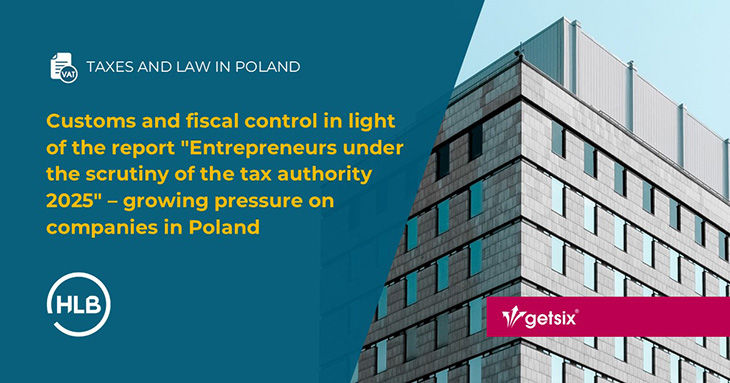Customs and fiscal control in light of the report “Entrepreneurs under the scrutiny of the tax authority 2025” – growing pressure on companies in Poland
Customs and fiscal control is becoming one of the main mechanisms shaping the relationship between entrepreneurs and the tax administration in Poland. The latest report, “Entrepreneurs under the scrutiny of the tax authority 2025“, prepared by MDDP and the Lewiatan Confederation (a leading Polish employers’ organization), shows how the landscape of control activities in Poland is evolving – from scale and methods to the consequences for businesses.
It is important to note that the Polish tax administration currently has two main types of control proceedings: tax audits, conducted by local tax offices, and customs and fiscal controls, carried out by specialized units of the Polish National Revenue Administration (KAS – Krajowa Administracja Skarbowa). The latter – significantly more extensive and less formalized – is increasingly replacing traditional tax audits, becoming the main tool for verifying businesses in Poland.
In this article:
Dominance of customs and fiscal controls
The report reveals a sharp increase in the importance of customs and fiscal controls over the past five years in Poland. In 2019, they accounted for just 12.5% of all controls, while in 2024 they represented more than 38%. According to KAS, this trend is expected to continue.
Although Polish customs and fiscal offices have broader competencies, businesses face limited legal protection during such audits. The lack of clearly defined timeframes and the extensive powers of the authorities exacerbate the asymmetry between the controlling body and the taxpayer.
117,500 audits and PLN 45 billion in tax shortfalls
Between 2019 and 2024, a total of 117,500 audits were conducted in Poland – an average of 77 per day (around 59 tax audits and 18 customs and fiscal audits). The peak was in 2022, and the lowest in 2024 – a trend that experts attribute to better access to data and more effective company selection.
During this period, more than PLN 45 billion (approx. EUR 10.5 billion) in tax shortfalls were detected:
- PLN 27.5 billion from customs and fiscal controls,
- PLN 18 billion from tax audits.
The average tax liability identified in a single customs and fiscal control exceeded PLN 1 million – a clear signal that each audit in Poland can pose a serious financial risk to a company.
“Effectiveness” at 98%?
In 2024, irregularities were identified in 98% of tax audits and 94% of customs and fiscal audits. Such high “effectiveness” raises questions – are we truly seeing a flawless system of selecting cases, or is there pressure for every audit to result in a finding of non-compliance?
This is all the more significant considering that the actual number of payments following audits remains relatively low, suggesting that some decisions may be premature or poorly documented.
Lack of notifications and lengthy proceedings
Only 1 in 10 taxpayers in Poland received advance notice of an audit, even though regulations state this should be standard practice. The absence of prior notice prevents voluntary correction of errors and increases stress and procedural risk.
Audit durations are another serious issue:
- Customs and fiscal controls: average 332 days,
- Tax audits: average 113 days.
Such lengthy procedures not only create costly uncertainty for companies but also result in real financial burdens – for example, accruing interest on tax arrears.
Customs and fiscal control requires balance
The report clearly indicates that customs and fiscal control, as an increasingly common tool of Polish tax administration, should be based on the principle of balance – between the effectiveness of the tax authority and the genuine protection of taxpayer rights.
Among the report’s key recommendations are:
- Increasing the transparency of procedures,
- Restoring real procedural safeguards,
- Standardizing and shortening the duration of audits.
Conclusions for companies
The report “Entrepreneurs under the scrutiny of the tax authority 2025” makes it clear that customs and fiscal control is no longer an incidental event, but a significant systemic risk factor in conducting business in Poland. In light of the growing scale and intensity of control activities by the Polish tax administration, companies should ensure proper procedural and documentation preparedness.
To protect your company’s interests in Poland, it is advisable to proactively analyze potential risk areas and seek professional support from tax law specialists. Experienced tax advisors can not only minimize the consequences of potential irregularities but also ensure ongoing tax compliance and security at every stage of business activity. We invite you to take advantage of the tax advisory services offered by the experts at getsix®.
If you have any questions regarding this topic or if you are in need for any additional information – please do not hesitate to contact us:
CUSTOMER RELATIONSHIPS DEPARTMENT

ELŻBIETA
NARON-GROCHALSKA
Head of Customer Relationships
Department / Senior Manager
getsix® Group
***














